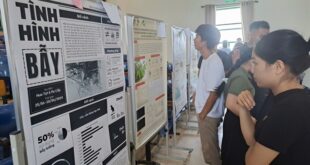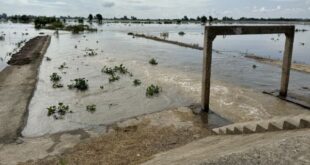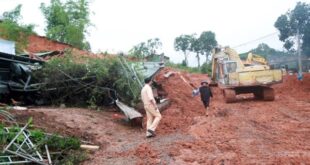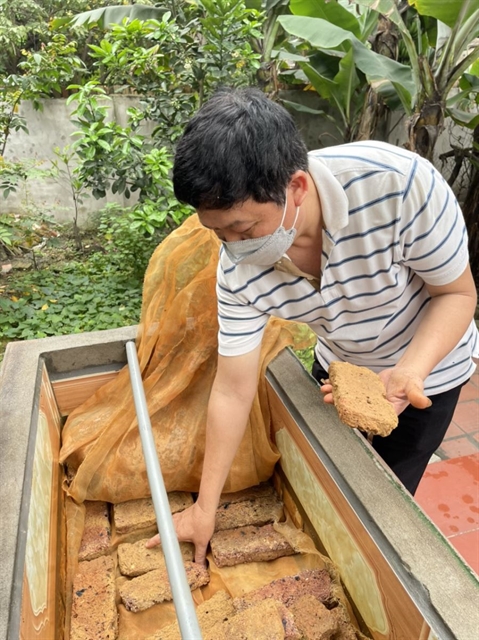
HÀ NỘI — Just on the outskirts of the capital city, the people of Tân Minh Commune in Sóc Sơn District have struggled for decades with polluted water.
To ensure water for everyday use, Nguyễn Thị Tĩnh’s family has had to set up two water filtration systems. Even then, it takes one more filtering process for the water to become drinkable.
Their ‘homemade’ filtration system is lined with sponge, sand, and rock. Raw water will go through these layers, then is pumped to a tank to let the sediment settle.
Yet even when the filters turn yellow and the sediment is left to settle for days, this water still has black specks and a pungent smell.
Tĩnh said: “Water coming from this system can only be used to wash raw vegetables and other stuff, as it still has a very strong smell.
“For drinking and showering, we need to filter it one more time with the purification machine.”
Her husband, Đinh Ngọc Đạt said that they had been living like this since 1972 when they first moved here, but in all that time, nothing had changed.
It is not easy to drill wells in this area. The family has a 72-metre-deep well, but not much water is coming out. Right next door, one of their neighbours just drilled 80 metres into the ground but couldn’t find any water.
“We just want to have clean water,” said Đạt.
“60 per cent of the people here are senior citizens, and years of using contaminated water have taken a toll on their health and life expectancy.”
Not every household can afford a filtration system either. According to Vũ Mạnh Hùng, head of Residential area no. 418 in the commune, there are more than 200 households with a population of 600, but around 100 families are without a water purification system.
For these households, they have to pump the polluted water from the well to the tank for daily use. These tanks need cleaning every seven to ten days as they collect a huge amount of gunk and sediment.
Hùng said: “My family also run the water through the filtration system before use, but brushing teeth and washing our face with this stinky water is really unbearable, it also affects our health and daily life.
“If we don’t change the sponge in the filter, it will harden after just one or two months and won’t let the water go through.”
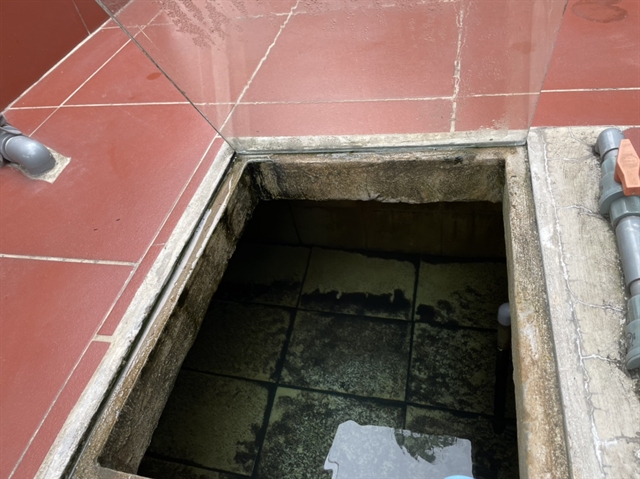
According to Nguyễn Văn Tường, vice chairman of Tân Minh Commune People’s Committee, tap water only accounts for 20 per cent of the local water system.
Tường also said the situation is partially due to the existing water source in the area, and also because of the waste from agricultural production, which still gradually affects the water supply even after treatment.
Tân Minh Commune is also close to the Nam Sơn Waste Treatment Complex, which has a negative effect in the long run.
The local people and authorities have reported to the upper levels and requested for investment in clean water supply. However, the response has yet to meet their needs.
Tường said: “We have invited water supply consultants over to help people address the situation and help to have clean water for daily use.
“We also advise them to raise livestock a distance away from the residential area, and supervise waste from production plants to make sure that it meets the safety standards for groundwater.”
According to Triệu Đức Huy, deputy director of the National Center for Water Resources Planning and Investigation, local groundwater is being harnessed well within permissible capacity.
However, inappropriate methods and a lack of proper planning lead to negative impacts in areas across the country.
Huy said: “Improper groundwater harnessing in terms of location and volume has led to a decrease in the water level and eventually depletion.
“Some of the urgent solutions to protect, prevent, and minimise water depletion, salinisation and pollution is to put a limit on groundwater harnessing in certain areas; using groundwater resources reasonably; preserve the quality and volume of groundwater reserve; and protect the supply of aquifers.” — VnExpress News
- Reduce Hair Loss with PURA D’OR Gold Label Shampoo
- Castor Oil Has Made a “Huge” Difference With Hair and Brow Growth
- Excessive hair loss in men: Signs of illness that cannot be subjective
- Dịch Vụ SEO Website ở Los Angeles, CA: đưa trang web doanh nghiệp bạn lên top Google
- Nails Salon Sierra Madre
 VnExpress News The News Gateway of Vietnam
VnExpress News The News Gateway of Vietnam
